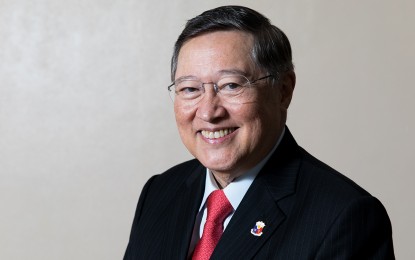
Finance Secretary Carlos Dominguez III
MANILA – Employees working for the micro, small and medium enterprises (MSMEs) will get additional government support as part of the program to help lessen the impact of the coronavirus disease 2019 (Covid-19) pandemic to their livelihoods.
“We will announce a program to assist the employees of MSMEs by tomorrow (April 14), as well as to assist the MSMEs with a loan guarantee program. This will be aimed at what people call the middle class,” Finance Secretary Carlos Dominguez III told journalists in a Viber message Monday.
Dominguez said the government continues to help people affected by the global pandemic but added the distribution of cash support is only targeted for poor households and the vulnerable sector to date.
In a phone-patch interview by CNN Philippines Monday, he said the initial government support for the middle class comes in the form of policies that require financial institutions, among others, to extend the payment period for loans and credit cards with due dates falling during the quarantine period.
He said the Bayanihan to Heal as One Act also mandates banks, among others, not to slap their customers with interest or additional fees on unpaid bills due within the quarantine period.
Dominguez discounted any cash aid for the middle class to date “because when we define middle class, we define the middle class as those people who have regular jobs.”
He, however, said the about three to 3.5 million MSME workers will “evidently will receive cash support.”
“The total cost will be between PHP35-51 billion. So that part of the middle class, they will receive support,” he added.
Dominguez further said the government currently has sufficient funds to address the contagion.
The government has established a four-pillar socioeconomic strategy against the impact of Covid-19 and the first of these pillars is the support for the vulnerable groups and individuals.
Included in the first pillar is the PHP205-billion emergency subsidy program for 18 million low-income families belonging to the informal sector, the PHP35-billion wage subsidy for employees of MSMEs, the PHP30 billion top-up for local governments to support their vulnerable constituents, the PHP16.5 billion for rice programs of the Departments of Agriculture (DA) and the Department of Trade and Industry (DTI), the PHP10 billion for Land Bank of the Philippines (Landbank) emergency loan program for local government units (LGUs).
Also part of the first pillar are the PHP2.8 billion additional fund for DA’s Survival and Recovery Assistance Program (SURE Aid) for zero-interest loans of up to PHP25,000 for affected farmers and fishermen, PHP2 billion for Department of Labor and Employment (DOLE) cash assistance program for displaced workers, the PHP1-billion DTI loan program for MSMEs and PHP203 million for enterprise development training and livelihood kits; PHP1.2 billion for Social Security System (SSS) unemployment benefits, PHP3 billion for Technical Education and Skills Development Authority (TESDA) online upskilling courses for workers, the up to PHP15-million loan assistance from DA for micro and small enterprises engaged in agriculture and fisheries production, the tax benefits like tax relief for donations of medical supplies and relief goods, and the 30-day grace period on commercial rents and moratorium on loan payments of MSMEs due during the enhanced quarantine period.
The second pillar involves the utilization of about PHP8 billion to purchase medical supplies and testing kits, among others.
The funds will come from the Philippine Amusement and Gaming Corporation (Pagcor) and the Philippine Charity Sweepstakes Office (PCSO), amounting to PHP2.9 billion; half of the PHP300-billion grant from the Asian Development Bank (ADB); and the PHP5-billion loan from World Bank (WB).
The third pillar is about the fiscal and monetary actions to finance the Covid-19 response and these include the PHP310 billion additional financing from several multilateral agencies like ADB and WB, and the PHP300 billion extended by the Bangko Sentral ng Pilipinas (BSP) for the purchase of government securities that are redeemable at a maximum of six-month period.
The last pillar is about the bounce-back program for the economy that involves, among others, the continued investment for infrastructure programs. (PNA)
